Flag of Wales
The flag of Wales (Welsh: Baner Cymru or Y Ddraig Goch, meaning 'the red dragon') consists of a red dragon passant on a green and white field. As with many heraldic charges, the exact representation of the dragon is not standardised in law and many renderings exist. It is not represented in the Union Flag.
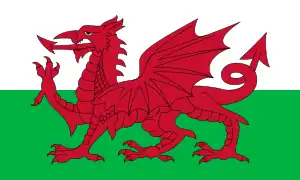 | |
| Use | National flag |
|---|---|
| Proportion | 3:5 |
| Adopted | 1959 (current version) |
| Design | The Welsh Dragon centered on a horizontal bi-colour of white and green |
The red dragon of Wales personifies the fearlessness of the Welsh nation.[1] Vortigern (Welsh: Gwrtheyrn) King of the Celtic Britons from Powys is interrupted whilst attempting to build a fort at Dinas Emrys. He is told by Merlin/Ambrosius (Welsh: Myrddin) to dig up two dragons beneath the castle. He discovers a red dragon representing the Celtic Britons (now Welsh) and a white dragon representing Anglo-Saxons (now English). Merlin/Ambrosius prophesies that the Celtic Britons will reclaim the island and push the Anglo-Saxons back to the sea.[2][3]
As an emblem, the red dragon of Wales has been used since the reign of Cadwaladr, King of Gwynedd from around AD 655.[4][5] The Red Welsh dragon is often described as the "Red Dragon of Cadwaladr" for this reason.[6] Historia Brittonum was written c. 828, and by this point the dragon was no longer just a military symbol but associated with a coming deliverer from the Saxons, and for the first time as a symbol of independence. It is also the first time that the colour of the dragon is verifiably given as red. Nevertheless there may well be an older attribution of red to the colour of the dragon in Y Gododdin.[7] The story of Lludd a Llefelys in the Mabinogion settles the matter, firmly establishing the red dragon of the Celtic Britons being in opposition with the white dragon of the Saxons.[8] Tudor colours of green and white were added by Henry VII at the Battle of Bosworth in 1485, after which it was carried in state to St Paul's Cathedral and a dragon added as a supporter of the Tudor royal arms.
It was officially recognised as the Welsh national flag in 1959. Several cities include a dragon in their flag design, including Cardiff, the Welsh capital.
Symbolism
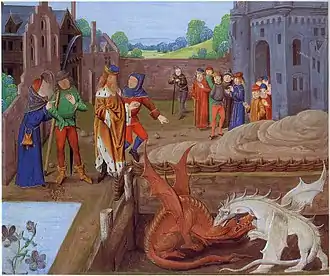
Historia Brittonum was written c. 828, and by this point the dragon was no longer just a military symbol but associated with a coming deliverer from the Saxons, and for the first time as a symbol of independence. It is also the first time that the colour of the dragon is verifiably given as red. Nevertheless there may well be an older attribution of red to the colour of the dragon in Y Gododdin.[7] The story of Lludd a Llefelys in the Mabinogion settles the matter, firmly establishing the red dragon of the Celtic Britons being in opposition with the white dragon of the Saxons.[8]
The dragon of Wales was used by numerous Welsh rulers as a propaganda tool; to portray their links to the Arthurian legend, the title given to such rulers is Y Mab Darogan (The prophesied Son).[9] The Welsh term draig, 'dragon' was used to refer to Welsh leaders including Owain Gwynedd,[10] Llywelyn ap Gruffudd (Llywelyn the Last)[11] and "the dragon" Owain Glyndŵr.[12] Cynddelw Brydydd Mawr, a court poet to Owain Gwynedd refers to him in one elegy, personifying him as "The golden dragon of Snowdonia of eagles".[10][13]
Henry VII recognised the red dragon upon its blessing at Saint Paul's Cathedral following his victory at Bosworth Field under the realm of 'England and Wales' in 1485; the United Kingdom would not recognise the flag's official status again until 1959,[14] despite the dragon being used by Romanised Celtic Britons since at least the fall of the Roman empire in 6th century AD.[15]
History
Cadwaladr
As an emblem, the red dragon of Wales has been used since the reign of Cadwaladr, King of Gwynedd from around 655AD.[4][5] The Red Welsh dragon is often described as the "Red Dragon of Cadwaladr" for this reason.[6] Later Taliesin poems reference the return of Cadwaladr (r. c. 655 to 682) and coming Saxon liberation. Nevertheless these are perhaps as old as late 7th century, and speak of the draig ffaw ffyst gychwyned.[16]
Kingdom of Gwynedd
.svg.png.webp)
The Senior line of the House of Aberffraw descended from Prince Llywelyn the Great in patriline succession and became extinct on the death of Owain Lawgoch in 1378.[17]
Owain Glyndŵr
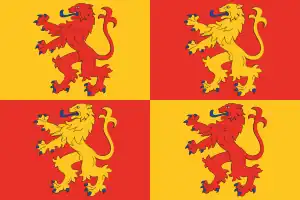
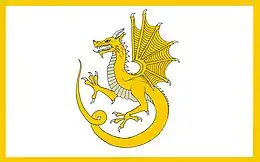
In 1400, Owain Glyndŵr raised the dragon standard during his revolts against the occupation of Wales by the English crown. Owain's banner known as Y Ddraig Aur ('The Golden Dragon') was raised over Caernarfon during the Battle of Tuthill in 1401 against the English. The flag has ancient origins, Glyndŵr chose to fly the standard of a golden dragon on a white background, the traditional standard.[18][19][20]
Henry VII

In 1485, the most significant link between the symbol of the red dragon and Wales occurred when Henry Tudor flew the red dragon of Cadwaladr during his invasion of England.[21] Henry was of Welsh descent and after leaving France with an army of 2,000, landed at Milford Haven on 7 August. He made capital of his Welsh ancestry in gathering support and gaining safe passage through Wales. Henry met and fought Richard III at the Battle of Bosworth Field, and in victory took the English throne. After the battle, Henry carried the red dragon standard in state to St Paul's Cathedral, and later the Tudor livery of green and white was added to the flag.[22]
Modern flag
In 1807, the red dragon on a green mount was adopted as the Royal Badge of Wales,[23] and on 11 March 1953[24] the motto Y Ddraig goch ddyry cychwyn ('The red dragon gives impetus' or 'The red dragon leads the way') was added, a line from the poem by Deio ab Ieuan Du. The badge was the basis of a flag of Wales[25] in which it was placed on a horizontal white and green bicolour. However, the flag was the subject of derision, both because the tail pointed downwards in some iterations[26] and because the motto was a potential double entendre, used in the original poem to allude to the penis of a copulating bull.[23][27][28] In 1959, government use of this flag was dropped in favour of the current flag[29][30] at the urging of the Gorsedd of Bards.[31] Today the flag can be seen flying from the Senedd in Cardiff, and from Welsh Government buildings.
In 2017 the Unicode Consortium approved emoji support for the Flag of Wales[32] following a proposal from Jeremy Burge of Emojipedia and Owen Williams of BBC Wales[33] in 2016.[34] This was added to major smartphone platforms alongside the flags of England and Scotland in the same year.[35] Prior to this update, The Telegraph reported that users had "been able to send emojis of the Union Flag, but not of the individual nations".[36]
 Flag of Wales from the 1919 Marshal Foch victory-harmony banner
Flag of Wales from the 1919 Marshal Foch victory-harmony banner.svg.png.webp) Variant depicting the dragon on a green mount[37]
Variant depicting the dragon on a green mount[37].svg.png.webp) Flag of 1953–1959, depicting the Royal Badge of Wales after its augmentation of honour.
Flag of 1953–1959, depicting the Royal Badge of Wales after its augmentation of honour. Flag of Y Wladfa
Flag of Y Wladfa
Other flags
Flag of Saint David
The flag of Saint David, a yellow cross on a black field, is used in the emblem of the Diocese of St Davids and is flown on St David's Day. In recent times the flag has been adopted as a symbol of Welsh nationalism. Some organisations, such as the Christian Party use this flag instead of Y Ddraig Goch, citing their dissatisfaction with the current flag.[38]
Government ensign
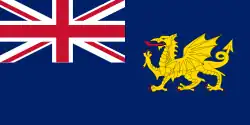
An ensign for use aboard ships used by the Welsh Government, such as the patrol boats of the Marine and Fisheries Division, was granted in 2017.[39]
In popular culture
The flag of Wales has been used by those in the arts, sport and business to show a sense of patriotism or recognition with Wales. During the 1999 Rugby World Cup, which was hosted in Wales, the opening ceremony used the motif of the dragon several times, though most memorably, the flag was worn on a dress by Welsh singer Shirley Bassey.[40]
Other musicians to have used the flag, include Nicky Wire of Manic Street Preachers, who will often drape the Welsh flag over amps when playing live,[41] and Cerys Matthews who has worn the image on her clothes,[42] while classical singer Katherine Jenkins has taken the flag on stage during live performances.[43]
Former Pink Floyd bassist Roger Waters's album Radio K.A.O.S. (1987) follows the story of a young disabled Welsh man, grounded in California, who regularly expresses nostalgia and a hope for return to his home country. The chorus of "Sunset Strip" uses the imagery of the flag of Wales to further emphasise this:
And I sit in the canyon with my back to the sea
There's a blood-red dragon on a field of green
Calling me back, back to the Black Hills again.
In 2018, the flag made an unexpected appearance in Black Panther, during a scene set in the United Nations. The flag is displayed alongside those of independent sovereign nations, leading to speculation that Wales is an independent nation in the Marvel Cinematic Universe. The scene led to comments and discussions, including from the Welsh Government and Plaid Cymru.[44][45][46]
See also
References
- Williams, Ifor (1959). "Gwrtheyrn (Vortigern)". Dictionary of Welsh Biography. National Library of Wales.
- "National symbols of Wales". Wales. 3 July 2019. Retrieved 6 September 2022.
- "Red Dragon of Wales". www.maryjones.us. Retrieved 12 August 2022.
- "Wales history: Why is the red dragon on the Welsh flag?". BBC News. 6 July 2019. Retrieved 29 October 2022.
- "Y Ddraig yn Nychymyg a Llenyddiaeth y Cymry c.600 – c.1500" (PDF).
- Sikes, Wirt (1881). British Goblins: Welsh Folk Lore, Fairy Mythology, Legends and Traditions. J. R. Osgood. p. 393.
- Lofmark, Carl (1995). A history of the red dragon. Gwasg Carreg Gwalch. OCLC 1302083973.
- Historia Brittonum, ch. 40–42.
- "Has Wales turned on Mark Drakeford over Covid? | the Spectator". 11 December 2020.
- Llywelyn, Llywarch ap (1991). Gwaith Llywarch ap Llywelyn (in Welsh). Gwasg Prifysgol Cymru. ISBN 978-0-7083-1084-7.
- Stephens, Thomas II (1849). The Literature of the Kymry Beeing a Critical Essay on the History of the Language and Literature of Wales During the 12. and Two Succeeding Centuries (etc.). William Rees and Longman. p. 381.
- Hemans, Mrs (1881). The Poetical Works of Felicia Hemans: With Memoir, Explanatory Notes, Etc. J. Wurtele Lovell. p. 246.
- Owen, Robert (1891). The Kymry: Their Origin, History, and International Relations. W. Spurrell and Son.
- "Dragon spirit: The legend of the Welsh dragon".
- "Wales history: Why is the red dragon on the Welsh flag?". BBC News. 6 July 2019.
- Taliesin; Williams, Sir Ifor (1960). Canu Taliesin: Gyda Rhagymadrodd A Nodiadau (in Welsh). Gwasg Prifysgol Cymru.
- Davies, John (2007). A History of Wales. Penguin UK. ISBN 978-0-14-192633-9. Retrieved 23 December 2019.
The plot was carried out (by a Scot) in 1378, and Saint Leger on the banks of the Garonne (opposite Chateau Calon Segur - not a Welsh name, alas) became the burial place of the last of the senior male line of the house of Aberffraw. Following the extinction of that line,...
- Hackett, Martin (30 July 2014). Lost Battlefields of Wales. Amberley Publishing Limited. ISBN 9781445637037.
- Davies, John (25 January 2007). A History of Wales. Penguin Adult. ISBN 9780140284751.
- Breverton, Terry (15 May 2009). Owain Glyndŵr: The Story of the Last Prince of Wales. Amberley Publishing Limited. ISBN 9781445608761.
- The dragon and war BBC Wales history
- Perrin, W.G. (1922). British Flags. Cambridge: Cambridge University Press.
- Davies, John; Jenkins, Nigel (2008). The Welsh Academy Encyclopaedia of Wales. Cardiff: University of Wales Press. ISBN 978-0-7083-1953-6.
- Origin of Y Ddraig Goch Archived 11 June 2010 at the Wayback Machine Flags of the World
- "Wales: History of Welsh Flags". Flags of the World.
- Raeside, Rob. "Origin of Y Ddraig Goch". Flags of the World. Retrieved 24 October 2018.
- Eriksen, Thomas; Jenkins, Richard (2007). Flag, nation and symbolism in Europe and America (1. publ. ed.). London: Routledge. p. 80. ISBN 9780415444040.
- Black, Ronald (1992). "Studies in honour of James Carney (1914–89)". Cambrian Medieval Celtic Studies (23): 109.
- Barraclough, EMC. Flags of the World, 1965.
- "Welsh Flag (Hansard, 23 February 1959)". Parliamentary Debates (Hansard). 23 February 1959.
- Lofmark, C. A History of the Red Dragon Archived 7 September 2008 at the Wayback Machine
- Titcomb, James (2017). "Emoji for England, Scotland and Wales flags to be released this year". The Daily Telegraph. Archived from the original on 12 January 2022. Retrieved 18 October 2018.
- "Wales flag emoji arrives on Twitter". BBC News. 24 May 2017. Retrieved 18 October 2018.
- Thomas, Huw (5 August 2016). "Wales flag emoji decision awaited". BBC News. Retrieved 18 October 2018.
- "Wales flag emoji arrives on iPhone". BBC News. 1 November 2017. Retrieved 18 October 2018.
- "Flags of England, Wales and Scotland given thumbs up by emoji chiefs". The Daily Telegraph. 11 December 2016. Archived from the original on 12 January 2022. Retrieved 18 October 2018.
- Barraclough, E.M.C. (1969). Flags of the World. London: Frederick Warne & Co Ltd. p. 55.
- "Christian group wants 'evil' Welsh flag changed". Wales Online. 3 March 2007. Retrieved 12 December 2017.
- Flag Institute Flagmaster Issue 160
- "World Cup kicks off in style". BBC News Online. 1 October 1999.
- "Manic Street Preachers – Nicky Wire". BBC Wales Music.
- "Pop music: The changing face of Brit guitar rock". The Independent. 27 March 1998.
- "Katherine Jenkins threatens to spill out of dress on stage as boyfriend Gethin Jones looks on". Evening Standard. 25 August 2008. Archived from the original on 5 April 2010.
- Brennan, Shane (16 February 2018). "Marvel movie franchise recognises Welsh independence". North Wales Live. Retrieved 12 March 2021.
- "Black Panther's universe features an 'independent Wales'". BBC. 16 February 2018. Retrieved 12 March 2021.
- Williams, Kathryn (16 February 2018). "Welsh flag flies as independent state in Marvel superhero film Black Panther". Wales Online. Retrieved 12 March 2021.
Bibliography
- Davies, John; Jenkins, Nigel (2008). The Welsh Academy Encyclopaedia of Wales. Cardiff: University of Wales Press. ISBN 978-0-7083-1953-6.
- Eriksen, Thomas; Jenkins, Richard (2007). Flag, nation and symbolism in Europe and America (1. publ. ed.). London: Routledge. p. 80. ISBN 9780415444040.

